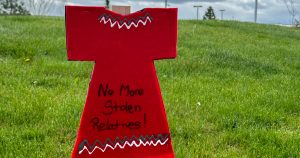By Casey Brown of the CUJ
SALEM, Ore. – A bill aimed at increasing protections for Indian children and a flood relief funding package of over $11 million are two of many stalled in the State Capitol.
Republicans in the Oregon State Senate walked out Feb. 24 and their counterparts in the Oregon House of Representatives joined them the following day. They left in protest over the so called “cap-and-trade” bill that aims to reduce carbon outputs to help mitigate global warming and climate change.
Republicans in the Oregon State Senate walked out Feb. 24 and their counterparts in the Oregon House of Representatives joined them the following day. They left in protest over the so called “cap-and-trade” bill that aims to reduce carbon outputs to help mitigate global warming and climate change.
Democrats have what is known as a supermajority, so Republicans walked out to deny the two-thirds majority of Senators needed to achieve a quorum and conduct business such as voting. That means the cap-and-trade bill won’t come to a vote.
Meanwhile, all other legislation, including the CTUIR’s priority bill, the Oregon Indian Child Welfare Act (House Bill 4148), cannot be considered either.
“The walkout has killed the ICWA bill because it needs an up or down vote on the floor of the Senate,” said Jane Hill, legislative affairs manager for the Confederated Tribes of the Umatilla Indian Reservation (CTUIR). “We did everything in our power to line up this bill, educate lawmakers and develop a product to insure the state is in compliance with federal law. Now we wait.” The constitutionally mandated last day of the legislative session is March 8.
Senator Bill Hansell (R – Athena) is not only among those who walked out, but he is also a chief sponsor of HB 4148. He represents District 29, which includes the Umatilla Indian Reservation and Umatilla County.
The Oregon Indian Child Welfare Act bill is the result of a vast workgroup process to codify the national standards of the Indian Child Welfare Act (ICWA) into Oregon statute. It is modeled after the Indian Child Welfare Act (ICWA), which passed at the federal level in 1978. ICWA came about because Indian children were being removed, via foster care and adoption, from their homes, families and communities at 25-35 percent, which is much higher than the rates for non-Indian children.
Despite the federal legislation, the problem persists. The bill promotes the safety of Native children, preserving tribal families and communities, recognizing tribal sovereignty, and creating a roadmap for compliance with federal law in courtrooms and Department of Human Services offices throughout the state.
“Despite requirements under the Indian Child Welfare Act, application of the Indian Child Welfare Act in Oregon courts is inconsistent,” the bill reads, “and clearly addressing…the coordination between and respective roles of the state and tribes…will provide uniform and consistent direction to state courts, tribes and practitioners,” the bill reads.
It goes on to say the bill’s purpose is “to prevent unlawful removals of Indian children from their families and promote the stable placement of Indian children in loving, permanent homes that are connected to family and culture.”
The Republican plan seems to be to run down the clock on the legislative session so the cap-and-trade bill, along with all other pending bills, will not come to a vote.
BOT member at large Corinne Sams travelled to Salem to testify on the bill when it was in House Judiciary Committee and she testified by phone from her office in the Nixyaawii Governance Center to the Senate Judiciary Committee. The bill moved through the necessary committees due to bipartisan and unanimous support from both Republicans and Democrats.
First, the bill started in the House Judiciary Committee where it passed unanimously and was referred to the floor for a vote by all House members. It passed unanimously there as well. Next, it moved to the Senate, where is passed the Senate Judiciary Committee unanimously.
Then trouble arose when Republicans deployed a stalling tactic.
The drafting of the bill was not a simple process. Brent Leonhard, attorney in the CTUIR Office of Legal Counsel, reviewed countless drafts that were modified over the course of eight months. The final bill was 53 pages long.
In order to insure that the language was accurate and there was buy-in from the state, the courts and the Tribes, a workgroup was formed to develop the language. That workgroup included Representative Tawna Sanchez, the Oregon Department of Justice, the Department of Human Services, the Oregon Judicial Department, invited legislators from both sides of the aisle, attorneys from Oregon’s federally recognized tribes, Legislative Counsel, national ICWA experts and Counsel from Judiciary Committees.
It remains to be seen what will happen to the pending bills.
With only three days remaining (as of press time) in the session, the fate of Oregon’s ICWA bill and many other pieces of legislation and state budgets are in Republican hands.




